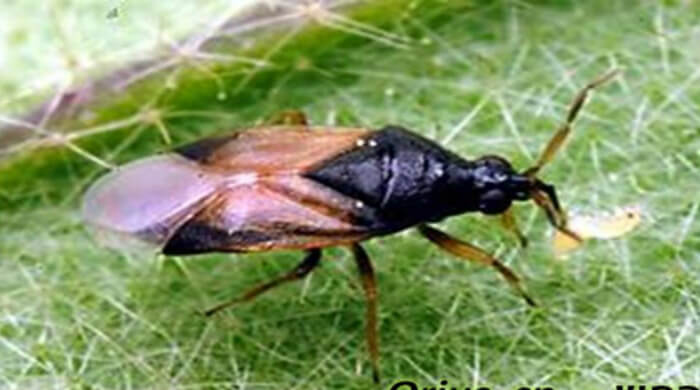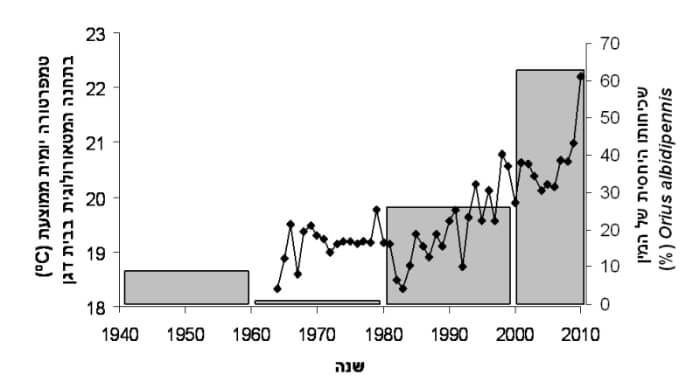Research: global warming has changed an ecosystem in Israel
Nebo is with me

Many of us feel that global warming is a somewhat ethereal threat, which will only materialize in a few years, when huge surges will drown the coastal cities. However, the warming is already here, and a new study proves that it is already causing changes in ecosystems in Israel. Researchers at the Smith Faculty of Agricultural, Environmental and Food Sciences, at the Hebrew University, examined how the change in temperature in recent decades affected bedbugs of the genus Orius (Parhash, in Hebrew).
These are tiny bugs of great agricultural importance, because they prey on pests of various crops. Prof. Moshe Kol from the Department of Entomology and research student Tarin Shuldiner-Harpaz, examined the distribution of the various species of Orius throughout the country, by collecting about 2,500 bedbugs over a period of about two years. They identified the different species and examined their relative prevalence compared to that published in several different studies - most of them local and not at all national - that were done in the last decades. "We found that at the same time as a significant increase in temp. The average in Israel since the 80s, there was a significant increase in the relative prevalence of the species Orius albidipennis, which is adapted to the desert climate," Shuldiner-Harpaz says. "In contrast, the species Orius laevigatus, which used to be the main and most common species in Israel, and is more adapted to a temperate climate, has become quite rare in Israel." To verify that the reason for the differences in distribution lies in the average temperatures, the researchers also examined the differences in the composition of the population of Aureus bedbugs between different geographical regions of the country (south vs. north) as well as the differences between the seasons. A similar trend was found in all the tests: the warmer it gets, the less the distribution of Orius laevigatus, which as mentioned was in the past almost the only species of Orius in Israel.
Baby, the bedbugs shrunk

In addition to the significant change in the distribution of bedbug species, the researchers discovered another interesting finding. They measured the body size of bedbugs collected in the current study, and compared it to measurements they made on Aureus bedbugs kept in the national collections at Tel Aviv University, and in the collections of the Agricultural Research Administration at Beit Dagan. The findings showed unequivocally - today's bedbugs are considerably smaller than members of their species collected about three decades ago, when the temperature was about three degrees lower. Several studies in the world have already shown that the warming causes the appearance of smaller animals, especially poultry. However, this is the first time that such a phenomenon has been observed in Israel as well. "I was surprised that you see it so clearly," Shuldiner-Harpaz says. I didn't think there would be such a big difference as a result of an increase of 3-2 degrees since the 80s doesn't seem significant, but in practice it turns out to be very significant for such small creatures."
Ecological importance
Although Aureus bugs are unknown to most of us, their ecological situation may well affect us - through the pocket. As mentioned, the bug is a natural enemy of some agricultural pests such as thrips and mites, mainly in pepper and strawberry crops. Without it, there will be more damage to agricultural produce, and prices are expected to rise. Farmers, by the way, don't just rely on nature to summon the predatory bug to protect their crops. They buy bed bugs from biological pest control companies, such as the Israeli Bio Bee from Kibbutz Sde Eliyahu (Bio Bee), and release them in the fields and greenhouses. "The bug we studied is an important biological exterminator in agriculture, so it can be estimated that the effect of warming will be the worsening of the attack by pests," says the head of the research team, Professor Moshe Kol. "This is due both because a high temperature will accelerate their development and the construction of the populations, and because, as we have shown, the high temperature reduces the body size of the bed bug, and therefore its predation capacity is expected to decrease."
The bug as a proverb

The new study was recently published in the scientific journal Plos One. Although he only deals with one type of bedbug, it is very possible that the warming is already affecting - and will continue to affect - other animals and entire ecosystems. "Of course, temperature has broad consequences on the physiology of living things - whether it's plants that provide us with food, whether it's animals in the ecosystem - it also affects their reproduction and survival," says Prof. Cole. "Therefore it is expected that the entire system will undergo changes. Some species will disappear because they won't be able to handle the high temperature, and others will migrate north or south towards the poles, to try to maintain the temperature they were used to." So for those who doubted, warming is already here, and it is already affecting our immediate environment. And what about the huge surges? They too will arrive in the end, especially if we continue to ignore the warning signs that nature - and scientists - place before us.

3 תגובות
Followers of the Flying Spaghetti Monster faith will say that since the pirate girls, there has been global warming.
It's about the same figure. Especially as Shabt-ya says about the sprays.
It is great that the bug is a biological exterminator, but there is no lack of fields that exterminate them with chemical spraying, and this is the first figure that should be taken into account when checking the decrease of insects. And it is interesting that there is not a single word about this in the results of the study.
*-There is no substantiation that the increase in temperature is the cause.
Unless there are areas in the country where there was no increase in temperature and there was no change in bedbugs - then there are only two trends happening side by side.
- No, there was no warming of 2-3 degrees in the last thirty years, as far as I know. At least not in global terms - not even close.
- It says there that the effect is between the varieties of the bedbugs - and not a reduction of the bedbugs - the bedbug that succeeds - doesn't it fulfill the same ecological role?
- It is enough to take any research as it is and give it a global warming spin.